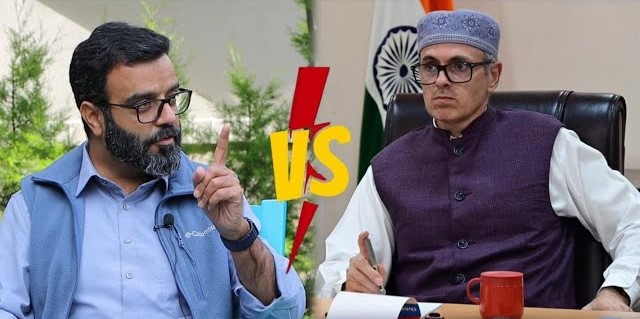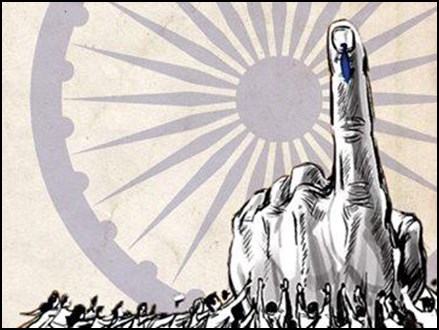Ruhullah Accuses Omar Abdullah of Betraying Voter Mandate, Cosying Up to BJP
By: Javid Amin | 26 October 2025
Internal Turmoil Rocks National Conference as Dissent Goes Public
Srinagar, October 2025 — A storm is brewing within the National Conference (NC) as MP Aga Ruhullah Mehdi openly accuses Chief Minister Omar Abdullah of betraying the voter mandate and compromising the party’s ideological stance against the Bharatiya Janata Party (BJP).
In a series of sharp public statements and social media posts, Ruhullah questioned Omar Abdullah’s leadership and accused him of drifting away from the NC’s core promises — dignity, autonomy, and accountability. His words have triggered an unprecedented wave of introspection inside one of Kashmir’s oldest political parties.
“We promised the people a fight for dignity, rights, and restoration of statehood. What they’re getting instead is silence, compromise, and proximity to the very forces that dismantled our autonomy,” Ruhullah declared during a youth convention in Srinagar.
His remarks — equal parts accusation and awakening call — have exposed simmering tensions within the NC, once again making Kashmir’s political stage the center of national attention.
The Rajya Sabha Fallout: A Catalyst for Rebellion
The spark that ignited this public rift was the recent Rajya Sabha elections, where the National Conference secured three out of four seats but lost the fourth to BJP’s Sat Paul Sharma.
The BJP’s surprise victory immediately led to allegations of cross-voting and internal betrayal, suggesting that some NC legislators may have covertly supported the saffron party.
Omar Abdullah publicly asserted that “all NC votes remained intact,” but Ruhullah wasn’t convinced. In a pointed social media challenge, he wrote:
“If you know who cross-voted, say it. The people deserve transparency. Silence is complicity.”
The remark struck a chord with party workers who have long demanded greater transparency from the leadership. It also amplified growing suspicion that the NC leadership had grown too comfortable with quiet understandings in the political corridors of New Delhi.
“This Isn’t What We Promised”: The Moral Argument
Ruhullah’s criticism goes beyond electoral grievances. It is a moral challenge — questioning whether the NC under Omar Abdullah has strayed from its ideological foundation.
In multiple interviews and public appearances, Ruhullah has emphasized that the NC’s mandate in the 2024 elections was built on restoring “dignity, identity, and development” — a promise that resonated deeply after the abrogation of Article 370.
Yet, one year into Omar’s government, critics say that the administration has delivered little beyond symbolic gestures such as the Darbar Move revival. Key pledges — from youth employment to statehood restoration — remain unfulfilled.
“The people voted for resistance, not resignation,” Ruhullah said. “Our silence now sounds like consent.”
For many within the party, this articulation captured the unspoken frustration of a grassroots base that feels disconnected from the leadership’s current tone.
Mian Altaf Joins the Chorus: A Party Divided
Ruhullah’s dissent found indirect reinforcement from senior NC leader and MP Mian Altaf Ahmad, who, without naming Omar, urged the party to “return to its people” and prioritize youth employment and rural governance.
His remarks at a rally in Kulgam signaled unease among senior members, many of whom fear the party is losing its moral clarity and grassroots connection.
An NC insider told Rising Kashmir:
“There’s a feeling that the leadership has become too Delhi-centric. The emotional pulse that once defined the NC is missing.”
While Omar Abdullah has maintained a restrained silence so far, insiders suggest that the CM’s inner circle is monitoring the dissent closely, viewing it as both a challenge and a warning sign of deeper organizational fatigue.
The Larger Context: A Crisis of Credibility
The NC’s internal turbulence comes at a delicate moment for Jammu & Kashmir politics. Public disillusionment is growing after years of political realignments and governance stagnation.
According to recent surveys by Kashmir Policy Watch, nearly 68% of respondents believe traditional parties like NC and PDP “have failed to adapt to post-Article 370 realities.”
The sentiment is particularly strong among younger voters, who view the older leadership as aloof and transactional. Ruhullah’s defiance, therefore, is not merely rebellion — it reflects a generational frustration with politics-as-usual.
“We need leadership that speaks truth, not diplomacy,” said Yasir Dar, a youth activist from Budgam. “If Ruhullah is asking for accountability, he’s only echoing what many feel.”
Omar Abdullah’s Dilemma: Silence or Strategy?
Chief Minister Omar Abdullah, known for his measured communication style, has so far avoided direct confrontation. However, sources close to his office hint that he views Ruhullah’s comments as “emotional overreach” during a politically sensitive period.
Privately, Omar’s aides argue that governance requires pragmatism, not perpetual confrontation with New Delhi. They believe that rebuilding trust with the Centre is essential for securing economic and administrative stability for the Union Territory.
Yet, this pragmatism is precisely what Ruhullah and his supporters interpret as moral drift — a softening of political will that weakens Kashmir’s bargaining position.
Political analyst Dr. Bashir Ahmad Mir explains:
“Omar’s politics is about coexistence; Ruhullah’s is about confrontation. Both approaches have logic — but in a polarized space like J&K, they are destined to clash.”
Cross-Voting and the Question of Accountability
The alleged cross-voting scandal remains the most immediate test of Omar Abdullah’s credibility.
Reports suggest that at least two NC legislators and one Independent may have defied the party whip during the Rajya Sabha elections, ensuring a victory margin for BJP’s Sat Paul Sharma.
While the Chief Minister insists on maintaining discretion, the opposition — and now his own MPs — are demanding disclosure.
“If you hide betrayal, you normalize it,” Ruhullah tweeted. “This isn’t about one seat. It’s about trust.”
This blunt challenge has forced NC leaders into uncomfortable territory, exposing the fault line between the party’s reformist rhetoric and its operational opacity.
Fallout: Opposition Unity Under Strain
The timing of this rift could not be worse for the broader anti-BJP alliance in J&K. The Congress and PDP, who recently extended conditional support to NC for the Rajya Sabha polls, are reportedly reconsidering their future alignments.
PDP insiders suggest that Mehbooba Mufti has expressed concern over NC’s internal instability, warning that “unity without honesty is temporary.”
Similarly, Congress leaders in Jammu said that they are “closely watching the NC’s internal cohesion” before committing to bypoll coordination.
The dissent, therefore, is not just a party problem — it is a coalition liability.
Public Reaction: Between Admiration and Anxiety
Across Kashmir, reactions to Ruhullah’s stand have been mixed but intense.
Many citizens admire his courage to speak openly, viewing it as a return to moral politics in a climate of calculated silence. Others worry that such infighting could weaken the only mainstream party still capable of counterbalancing the BJP.
Shazia Mir, a university professor in Srinagar, summarized the dilemma:
“We want honesty, yes — but we also need stability. If the NC breaks apart, the BJP grows stronger.”
This sentiment reflects the enduring paradox of Kashmiri politics — the yearning for both integrity and influence, even when the two seem mutually exclusive.
Media and Civil Society Response
Local media outlets have framed the controversy as “a defining moment for internal democracy within NC.” Editorials in Kashmir Reader and Greater Kashmir praised Ruhullah’s willingness to question his own party, contrasting it with the culture of conformity that dominates regional politics.
Civil society activists, however, urge restraint.
“Accountability must not turn into fragmentation,” said Imran Shafi, founder of the NGO Voices of Valley. “J&K needs constructive dissent, not self-destruction.”
The Road Ahead: Can the NC Contain Its Cracks?
For Omar Abdullah, the path forward involves both damage control and direction-setting. He must reassert authority without appearing authoritarian, and rebuild trust without deepening divides.
Party sources suggest that an internal review meeting is being scheduled to address “organizational discipline and communication protocols.”
Meanwhile, Ruhullah continues to gather moral traction. His consistent articulation of “truth over convenience” has made him a rallying figure for younger NC members seeking ideological clarity.
Whether Omar co-opts this dissent or confronts it head-on will determine the party’s stability as it heads into the November 2025 bypolls and next year’s civic elections.
Editorial Reflection: The Soul of a Party at Stake
The Ruhullah–Omar Abdullah conflict is more than an internal disagreement; it is a mirror reflecting the identity crisis of Kashmir’s oldest political institution.
It asks fundamental questions:
- Can pragmatism coexist with principle in a post-370 Kashmir?
- Is silence a strategy or surrender?
- And most importantly, who defines the moral compass of a party built on promises of dignity and resistance?
In an era when loyalty often overshadows honesty, Ruhullah’s defiance may yet prove to be the most consequential act of political integrity the Valley has witnessed in years.
As one veteran journalist wrote in Kashmir Life:
“Ruhullah isn’t rebelling against Omar alone. He’s rebelling against the comfort of forgetting.”



